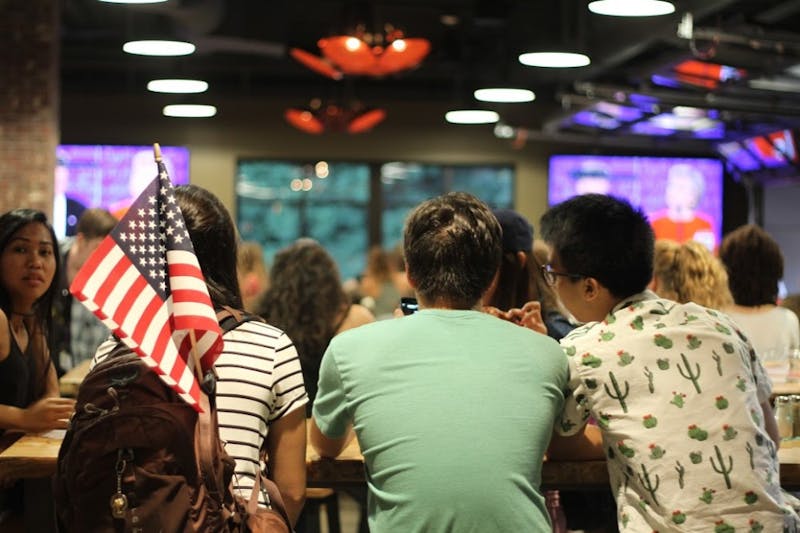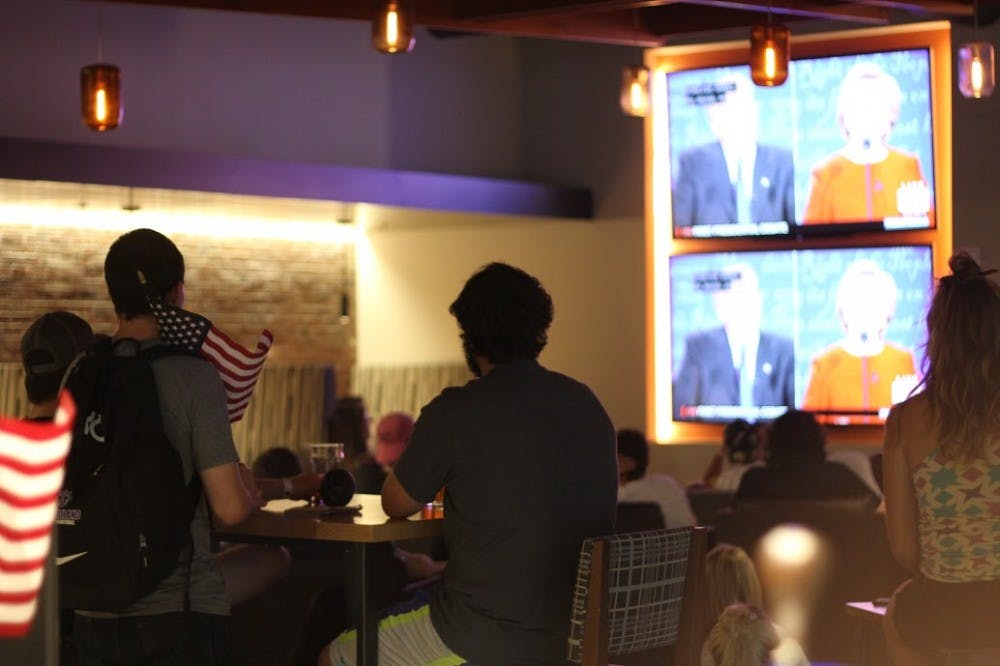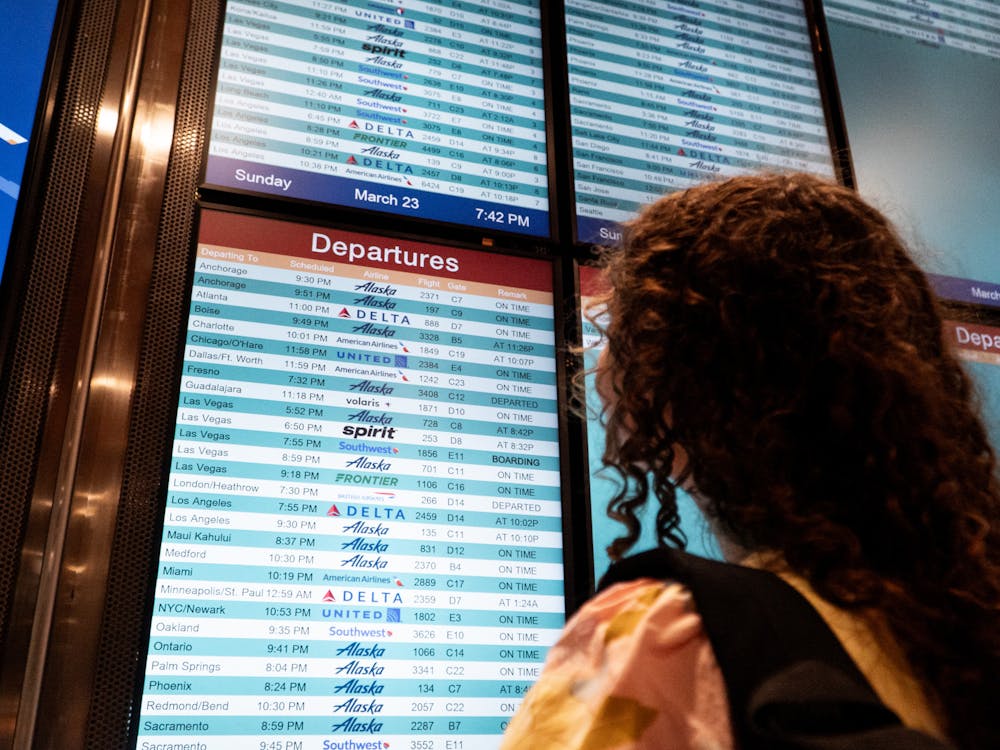The first presidential debate played live on the Pilot House TVs to an audience of nearly 200 students Monday night. Many students ate dinner, sat on the floor, worked on homework or drank a beer in the bar section as Democratic nominee Hillary Clinton and GOP nominee Donald Trump battled it out on the large screens before them.
The students listened intently to the debate and interacted with the candidates’ comments by applauding and cheering, like when Clinton mentioned debt free college and countered a Trump comment with: “At least I actually have a plan to defeat ISIS.” The watch party was hosted by VoteUP, which will be putting on a variety of election events leading up to Nov. 8.
The 90-minute debate, moderated by NBC’s Lester Holt, was divided into six 15-minute segments that related to three main topics chosen by Holt: “America’s Direction,” “Achieving Prosperity” and “Securing America.” Main points of the debate included the candidates' stances on jobs, taxes, foreign trade and race. Also presented were each candidate’s allegations of the other’s previous offenses.

As the result of a coin flip earlier this week, Clinton opened saying, “The central question in this election is what kind of country we want to live in.” She then went on to explain how her experience as former U.S. Secretary of State gave her the foreign diplomacy skills that will aid in developing international trade agreements that she says will help create jobs in America and will be necessary for national security and defeating terrorism.
In the candidates’ back-and-forth, Clinton called Trump out on his previous questioning of president Barack Obama’s citizenship, a doubt Holt said he was publicizing as recently as January. The two also debated his refusal to release his tax returns and his support of the invasion of Iraq, which he strongly denied during the debate though CNN reports he was on record supporting the invasion a month before it was approved by Congress.
“I think Clinton did what she needed to do,” said senior Emily Jones, who plans to vote for Clinton. “I look forward to when the fact checkers get on what Trump said … People will realize that he pulled a lot of things out of his ass.”
Throughout the debate, Trump continually circled back to his plan to reduce free trade and heavily tax companies manufacturing outside of the U.S. — promising to create 25 million new jobs in the country. When asked about his national security plan, Trump said he plans to “do something extremely tough” to defeat ISIS. He also advocated for bringing back "stop and frisk" to reduce violence in cities, a policy that was ruled unconstitutional in New York in 2013 because it "largely singled out black and hispanic young men," according to Holt.
He questioned Clinton’s use of a private email server during her tenure as Secretary of State, which she acknowledged as a mistake, and voiced his disapproval with the Iran Nuclear Deal that she set the stage for, though it was actually negotiated by her predecessor, John Kerry. Trump also took shots at Clinton as the first-ever female presidential candidate for a major national party, questioning whether she has the “look” and “stamina” of a president.
This event’s turnout was successful despite rocky attendance last week at VoteUP’s discussion on immigration, and polls that claim most college students are apathetic and disinterested in this election.

“I am really impressed about how many people showed up,” sophomore Kaitlin Flanigan said. “I heard that people our age aren’t really caring about this election, but I feel like they do. I see a lot of care about this election, and everyone watching right now seems interested.”
Natalie Buchholz, a junior and member of VoteUP, was excited and surprised to see such a successful turnout for the debate.
“We had hoped that many students would be interested in this event, as an indirect way of showcasing the issues surrounding the election,” Buchholz said. “This shows those involved in planning the VoteUP festivities that students are interested in getting involved in the discussion, and it is a sign of good things to come. We are hoping to use this momentum to carry us through the next weeks remaining in the election cycle.”
Freshman Natalie Betance encouraged her friends to watch the debate, and was initially disappointed that she would have to miss it because of class.
“I went into my software applications class … and I was talking to my teacher about the debate,” Betance said. “He was like, ‘I can see this debate is pretty important to you, you should just go back to the Pilot House.’ I love this school. I love debate season.”
Returning to the event allowed Betance to further develop her own views on both political candidates.
“Overall, I think the debate was more evenly matched than anyone anticipated,” Betance said. “If you don’t take the time to inform yourself on political opinions, then you can’t complain about what happens. If you didn’t take the time to do the work to inform yourself, then you don’t have a right to be upset about the outcome of this election.”
Kiley Gersch, a sophomore mechanical engineering student, pointed out that many students do have a passionate standpoint on this year’s election.
“I mean, how did we get here?” Gersch said. “How did we get to this place where we have to pick between two bad candidates? When did that become an acceptable form of democracy? I feel like in this election I have to pick from a lesser of two evils."
VoteUP will be hosting a follow-up discussion Tuesday Sept. 27 at 7 p.m. in St. Mary’s.









